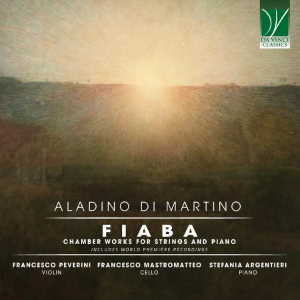
Aladino Di Martino (1908-1989)
Fiaba for cello and piano
Cello Sonata
Introduzione e Burlesca for violin and piano
Piano Trio in G major (1932)
Stefania Argentieri (piano), Francesco Peverini (violin), Francesco Mastromatteo (cello)
No recording details provided
Reviewed as lossless download
Da Vinci Classics C00814 [57]
I had not heard of Aladino Di Martino, who hailed from the Molise region of southern Italy. He studied under Francesco Cilea at the Naples Conservatory. As far as I can tell, this is only the second recording to include his music, the other being a 2021 release of more of his chamber music also on Da Vinci Classics. Oddly, while that recording was described as Volume 1, this new release neither calls itself Volume 2, nor mentions the other one.
Di Martino’s long life spanned much of the “difficult” music that proliferated across the 20th century, but those averse to that style of music need not be concerned. While he held on to the tradition of tonality, there isn’t a sense that he was stuck in the 19th century. The opening piece, Fiaba (Fairytale) is an Adagio for cello and piano, and showcases his gifts for melody and interesting rhythms. These talents are given full expression in the Cello Sonata, which is the disc’s standout. Only the slightly dull middle slow movement holds me back from calling this a masterpiece. The booklet notes suggest a French influence, which I certainly hear, and I think you could use Ravel’s Piano Trio as a pointer. The Piano Trio was apparently one of his best-loved works, and is lighter in atmosphere than the impassioned Sonata. One might say it is drenched in the sun of his native land. The final movement is dominated by spiky Bartókian rhythms, but closes in a more languorous manner. It is a work that has grown on me with repeated listens.
The only piece I didn’t really like was the Introduzione e Burlesca, especially the Burlesca section which was tuneless and scratchy. The booklet describes it as having “candid humor reminiscent of Histoire du soldat”, which given my antipathy to much of Stravinsky’s music explains a lot.
Performances of unknown music are always hard to judge, but given my predominantly highly favourable response to the music, I can only assume that the three artists have played a significant role in that. And no quibbles here about the violinist’s tone. The booklet notes provide good information about composer and music, and the sound quality is very natural.
This has been a real discovery. Apparently Di Martino wrote in many genres, but whether we are to hear anything other than chamber music, only time will tell. I certainly hope so.
David Barker
Buying this recording via a link below generates revenue for MWI, which helps the site remain free



















